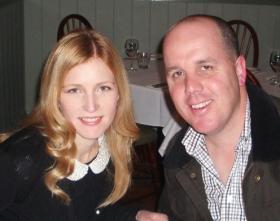Higher Thinking for Brain Cancer Research Fund to help PhD student

Commencing this month, Ashraf Zaman will begin his PhD studying low grade brain cancer under the supervision of scientist Dr Kerrie McDonald, the Cure Brain Cancer Chair in Neuro-Oncology at the UNSW Lowy Cancer Research Centre (supported by Cure Brain Cancer Foundation).
Zaman is supported with the help of Higher Thinking, a fund established in 2011 by husband and wife Dave Taylor and Shalom Andrews. Higher Thinking particularly focuses on the research of low grade brain tumours.
Dr McDonald, who hand-picked Zaman, says: “Diagnosis of a low grade glioma is bad enough. But what is worse is the unknown. Most low grade gliomas eventually progress to a higher grade. We don’t know what biological mechanisms trigger this progression and we don’t know why some progress faster than others. If we had a better understanding of the biology of low grade gliomas, we could develop new drugs to target the tumour while it is at a more benign state. Ashraf Zamanwill study the biology of tumours that have progressed from a lower grade by working with neurosurgeons and developing a laboratory model. There is currently no model available in the world. With a model we can determine what induces progression and more importantly, how we can stop the progression.”
Ashraf Zaman, who will be moving from Rome to Sydney to start his PhD, has an impressive background. After graduating in Microbiology from University of Dhaka in Bangladesh, he went to the University of Padova with a European Commission fellowship. Following this experience, he went to Santa Lucia Foundation European Brain Research Institute and then the University of Rome Tor Vergata in Italy.
Zaman says: “Iam highly passionate to develop my career as a cancer researcher as my mother died of cancer in my early childhood. Although the survival rate of some cancer patients has been improved in recent years, a lot more is yet to be done and it always motivates me to be a part of the cancer research community to better understand the biology of cancer.”
Low grade tumours cause major disruption in the lives of patients and their carers, often due to serious physical and mental disability that stems from the location of the tumour, and as a result of invasive treatments in the form of surgery, radiotherapy and chemotherapy.
Shalom was diagnosed with a low grade glioma in 2006, and has since undergone an awake craniotomy and treated with chemotherapy. Ms Andrews says:
“My diagnosis was completely out of the blue. At that time, I was the healthiest I had ever been in my life, and it was the last thing in the world I would have contemplated. After receiving the news, the most surprising thing for me was how little research there was about low grade tumours. It’s been eight years since my diagnosis, and there are still no real answers. There is not even a recommended treatment plan. My husband and I wanted to address this research gap, even in a small way. We never knew when we founded Higher Thinking that it would be the only fund in Australia, to our knowledge, that supports low grade tumour research. Since the fund’s inception, we have been overwhelmed with support, and are thrilled that Ashraf Zaman will commence this month under the supervision of Dr McDonald. We know that there are breakthroughs occurring overseas, and want to capitalise on that momentum. The talent is there, but what slows the process down is funding. When you are racing against the clock for a cure, positive advancement is what keeps you going.”
Back to top
Archive
- February
- March
- April
- May
- June
- July
- August
- September
- The complex lives of glia after...
- Randwick Precinct Initiating Early...
- Randwick Precinct Cancer Genomics...
- What are the mechanisms behind...
- Congratulations to new Associate...
- Medicine Learning L&T Forum
- Revolution in Breast Cancer -...
- The Split Personality of Glutamate...
- Lowy Cancer Research Centre...
- Cancer Metabolism roundtable
- Single Cell Epigenomics for...
- October
- November
